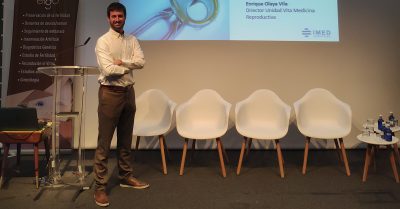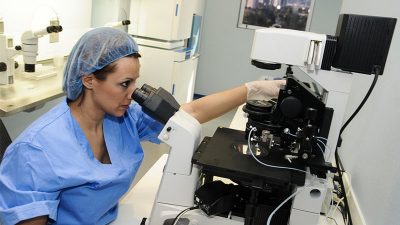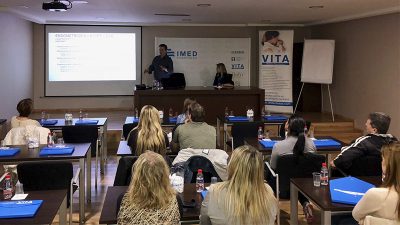Complete Fertility Study
Fertility problems affect 10-15% of couples. The first step will be to perform a fertility study to find out and assess the causes of infertility in both a woman and man. This stage will be carried out according to the personal characteristics of each patient.
What is a fertility study?
If after a year of sexual intercourse without using any contraceptive method, the desired pregnancy has not been achieved (or after six months in couples over 35 years of age), it is possible that you have a fertility problem. In this situation, it is advisable to see a specialist in reproductive medicine to diagnose the causes of infertility.
First visit
Prior to the fertility study, a first medical consultation is going through the couple’s medical history in detail, in order to validate personal and family history, environmental, work or lifestyle factors that may influence fertility.
The reproductive medicine specialist will ask a series of questions to find out the characteristics of each patient. In addition to the medical history, they will ask about the time the couple has been trying to have a child, frequency of sexual intercourse, the woman’s menstrual cycle, known fertility problems, family history, or if the patients are under any medical treatment.
Each patient and each situation requires a personalized fertility study. After this first consultation, the medical tests necessary to the fertility study will be considered.
Medical tests and exams of a fertility study
In the first consultation, the specialist will have been able to assess the potential existence of some type of pathology or disease that would affect fertility. As each case will be different, at VITA we design a fertility study tailored to each patient.
Not all tests will be included in a general fertility study. Most will be performed as standard procedure, while others will only be considered and added in some specific cases.
Fertility study in women
- Blood test: a blood test is performed where the blood type, its Rh factor, biochemistry and coagulation are studied. The testing of blood serum (serology) is also performed to rule out infectious diseases.
- Hormonal analysis: this test consists of extracting a blood sample from the patient to study the functioning of the ovary. Data on the ovarian reserve are obtained from this analysis, as well as the levels of FSH (Follicle Stimulating Hormone), Oestradiol, LH (Luteinising Hormone), Progesterone and especially the Anti-Mullerian hormone (AMH). These hormones are produced by the pituitary gland and the ovary and are determinants in the menstrual cycle to achieve a successful pregnancy. This test is usually done at the beginning of the menstrual cycle.
- Pelvic exam: The genital area, vagina, and orifice of the uterus are examined by direct exploration to assess the shape, size, appearance, and position of the uterus, and to detect a possible noticeable ovarian cyst or abnormal condition in the uterus. This exam is usually done on the first visit with the reproductive medicine specialist.
- Transvaginal ultrasound: a gynecological examination is performed using ultrasound in order to obtain precise data on the morphology of the uterus and ovaries, and on the functioning of the ovary and endometrium during the menstrual cycle.
- Hysterosalpingography (HSG): this is an x-ray of the pelvic area to see the uterus and the fallopian tubes, as well as their permeability. A liquid contrast is injected through the cervix, generally after the end of the period but before ovulation. With this examination it is possible to know if the tubes are blocked, one of the most common causes of infertility.
- Hysteroscopy: an endoscopic examination is performed by introducing through the cervix an optical tube that incorporates a mini-camera to accurately visualize the interior of the uterus as well as the cervical canal. This procedure enables detection of possible alterations within the uterus that can cause abortions or the impossibility of implanting the embryos.
- Endometrial biopsy: this test is performed by aspirating the endometrial mucosa through a cannula introduced into the uterus through the cervical canal. This sample is studied in the laboratory to find out if there are infections or abnormalities in the endometrium.
- Karyotype: from a blood test, the chromosomal pattern is studied to detect possible chromosomal abnormalities that explain infertility.
Male fertility study
- Blood analysis: a blood test will be carried out where the blood type, its Rh factor, biochemistry and coagulation are studied. The testing of blood serum (serology) is also performed to rule out infectious diseases.
- Semen analysis: this test consists of carrying out an analysis of the semen, where aspects such as the quantity of spermatozoa (concentration), their quality (mobility) and their shape (morphology) are evaluated. Due to its simplicity, it is the first test that is usually performed on the couple.
- Testicular exam: the testicles, their size and consistency are examined in a direct way to perceive some type of lump, swollen vein or infection in the penis. This exam is usually done on the first visit with the reproductive medicine specialist.
- Motile Sperm Count: it is a study that complements the semen analysis. It consists of cleaning the semen of any other fluid or substance that composes it to leave only the spermatozoa, in order to leave them in an environment that is rich in nutritious substances. A motile sperm count is performed to know how many sperm are useful for assisted reproduction techniques.
- Bacteriological and biochemical examination: it is possible to carry out a deep examination by means of a semen culture or blood test to detect possible infections that would alter the quality of the semen.
- Testicular biopsy: through a puncture, spermatozoa are retrieved from the testicles in order to carry out a semen analysis, if impossible to obtain through ejaculation.
- Hormone analysis: a blood test is performed to find out the levels of FSH, LH and testosterone hormones, which affect fertility.
- Karyotype: from a blood test, the chromosomal pattern is studied to detect possible chromosomal abnormalities that explain infertility.
Results after a fertility study
To get the complete result of these fertility tests usually takes about 3-4 weeks from the first interview. The fertility specialist, knowing the results of these tests, will be able to assess more precisely which assisted reproduction treatment will be best to achieve a successful pregnancy.




